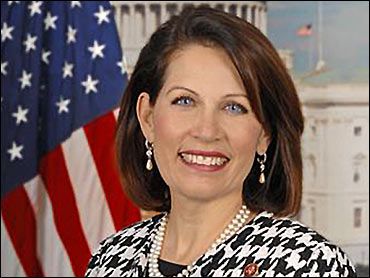Michele Bachmann, the Republican representative from Minnesota’s 6th legislative district, is running for President of the United States.
She is the only female candidate in the Republican primary, and last month became the first woman to win the Ames Iowa Straw Poll. She announced her candidacy on June 27 with high expectations. Because of her vocal presence as a Tea Party member and avid opponent of the Patient Protection and Affordable Care Act of 2009, she entered the race with an 83% general approval rating and a 74% recognition rating among Republican-leaning voters in a July poll. However, a recent poll shows that while her recognition climbed to 84%, her general approval rating dropped to 70%.
Bachmann, a founding member of the Tea Party Caucus, is a champion of the right wing of the Republican Party due to her widespread publicity and support for a fusion of supply side economics, classical economics, and social conservatism. Her economic positions reflect the deregulatory, small-government doctrine of the Tea Party, as well as aspects of supply side economics, demonstrated in her opposition to all tax hikes and her opposition to the payroll tax cut for workers, instead favoring long term tax cuts on income taxes and corporate taxes. Bachmann believes that homosexuality is a “disorder,” and she opposes the legal recognition of gay marriage, a main tenant of social conservatism. She does not believe in man-made global warming, and recently asserted that an HPV vaccine, mandated in the state of Texas by Governor Rick Perry, causes mental retardation.
This year, when the entirety of the Republican Party is united against President Obama, Republican candidates will enjoy high Republican approval; but, in the Republican primary, it is those with strong approval who will be able to edge out other contenders to be nominated. Bachmann’s initial, strong intensity score (the percentage of voters who strongly approve her policies minus the percentage that strongly oppose her) reflects the favor she holds in the Tea Party. But the recent decline of positive intensity in her presidential bid, from its peak of 21% in July to 11% in a September poll, shows that her campaign has lost much of the fervent support of the Tea Party it initially enjoyed. Primary newcomer Rick Perry may have crippled the campaign by taking up Tea Party support; in the aforementioned September poll, Perry holds a whopping 24% positive intensity score. Rick Perry has a position on the political spectrum close to Bachmann’s and enjoys similar Tea Party support.
Michele Bachmann, should she win the Republican primary, will find it hard to obtain the centrist vote because of President Barrack Obama, who has moved to the center since November of 2010 and will not face a primary challenger who will force him to secure the liberal vote. Although Bachmann’s position in the Republican primary looks as dim as ever, her recognition in national politics may allow her to weather Perry; if Perry falls in popularity, Bachmann could still pick up Tea Party votes and get the nomination.
Sources:
1 Anon. “Election 2012 Polling and News, Republican Presidential Candidates, Obama, Interactive Polling Data.” Gallup.com. Gallup, Inc., 21 Sept. 2011. Web. 21 Sept. 2011. <http://www.gallup.com/poll/election.aspx>.
2 Anon. Gallup.com. Gallup, Inc., 21 Sept. 2011. Web. 21 Sept. 2011.
3 Hess, Hannah. “Candidates Divide on Extension of Payroll Tax Cuts.” IowaPolitics.com. IowaPolitics.com, 26 Aug. 2011. Web. 21 Sept. 2011. <http://www.iowapolitics.com/index.Iml?Article=245933>.
4 Anon. Gallup.com. Gallup, Inc., 21 Sept. 2011. Web. 21 Sept. 2011.






